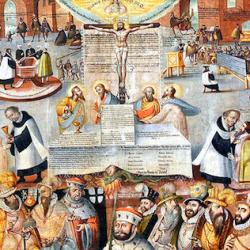In his Christian Ethics and the Church (67), Philip Turner provides a masterful summary of “the link Ephesians makes between the fulfillment of God’s purpose, the perception of God’s glory, and the common life of the assembly”:
The members of God’s assembly have been chosen ‘before the foundation of the world’ to be ‘holy and blameless’ before God ‘in love’ . . . . The grace bestowed in Christ engenders love, and love in turn elicits praise. Indeed, the destiny of those who make up the assembly is to live for the praise of God’s glory (1:12). The idea seems to be that the love manifest in the sacrifice of Christ and imitated in the common life of the saints (5:1-2) shows forth God’s grace and glory and so manifests God’s majesty to the entire creation. This manifestation in both the sacrifice of Christ and the life of the church draws all things to God and restores the unity of creation.
Turner rightly moves on into a discussion of unity in the Church and the evils of denominational division. In the light of his summary, we can see the full scope of the damage: If the church doesn’t walk in love, God’s majesty is not shown; if God’s majesty is not shown, the creation is not drawn into the unity for which God intends it; if the creation isn’t summed up in Christ, then God’s entire purpose for creation is frustrated.
In short, “failure to walk in love brings not honor but shame upon God’s name—and this leads God to take action that will clear his name.” But God does take action, and we can be as certain that the Church will be one as we are certain that all things come from Him and go to Him.











